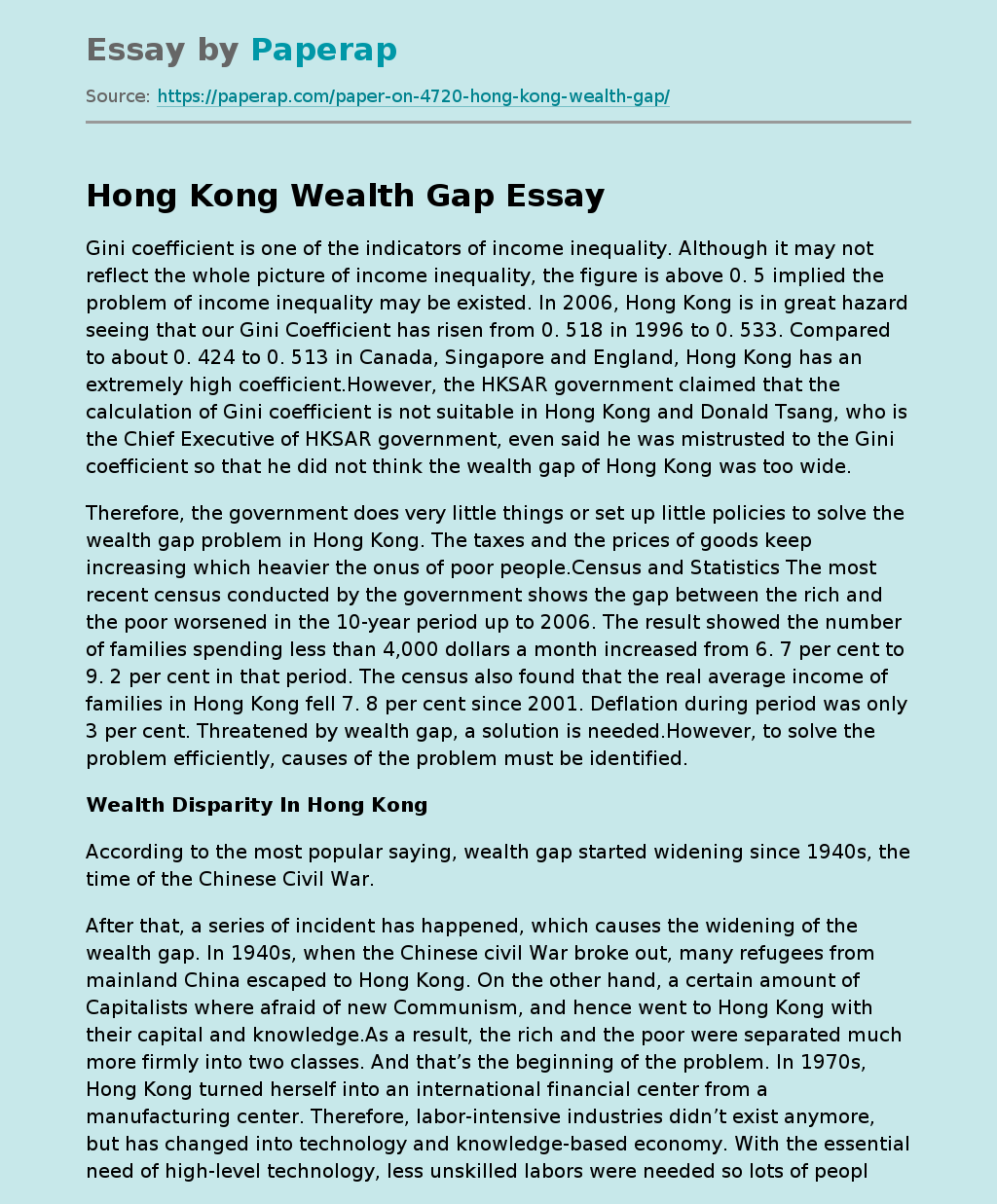Hong Kong Wealth Gap
Gini coefficient is one of the indicators of income inequality. Although it may not reflect the whole picture of income inequality, the figure is above 0. 5 implied the problem of income inequality may be existed. In 2006, Hong Kong is in great hazard seeing that our Gini Coefficient has risen from 0. 518 in 1996 to 0. 533. Compared to about 0. 424 to 0. 513 in Canada, Singapore and England, Hong Kong has an extremely high coefficient.However, the HKSAR government claimed that the calculation of Gini coefficient is not suitable in Hong Kong and Donald Tsang, who is the Chief Executive of HKSAR government, even said he was mistrusted to the Gini coefficient so that he did not think the wealth gap of Hong Kong was too wide.
Therefore, the government does very little things or set up little policies to solve the wealth gap problem in Hong Kong. The taxes and the prices of goods keep increasing which heavier the onus of poor people.Census and Statistics The most recent census conducted by the government shows the gap between the rich and the poor worsened in the 10-year period up to 2006.
The result showed the number of families spending less than 4,000 dollars a month increased from 6. 7 per cent to 9. 2 per cent in that period. The census also found that the real average income of families in Hong Kong fell 7. 8 per cent since 2001. Deflation during period was only 3 per cent. Threatened by wealth gap, a solution is needed.However, to solve the problem efficiently, causes of the problem must be identified.
Wealth Disparity In Hong Kong
According to the most popular saying, wealth gap started widening since 1940s, the time of the Chinese Civil War.
After that, a series of incident has happened, which causes the widening of the wealth gap. In 1940s, when the Chinese civil War broke out, many refugees from mainland China escaped to Hong Kong. On the other hand, a certain amount of Capitalists where afraid of new Communism, and hence went to Hong Kong with their capital and knowledge.As a result, the rich and the poor were separated much more firmly into two classes. And that’s the beginning of the problem. In 1970s, Hong Kong turned herself into an international financial center from a manufacturing center. Therefore, labor-intensive industries didn’t exist anymore, but has changed into technology and knowledge-based economy. With the essential need of high-level technology, less unskilled labors were needed so lots of people lost their jobs, while the educated ones had great opportunities on work.The wealth gap widened.
In 1980s, the Open Door Policy was adopted in China, Kong Kong benefited from it on the development on economy.
Nevertheless, a motto, ‘Let part of the people gets rich first’, was suggested by Deng Xiaoping. At the time, came to a rise of capitalists, while the others suffered from poverty. The wealth gap once again widened. In 1997, a serious financial storm attacked Hong Kong, the stock market suddenly crashed, lots of people suffered from the sudden incident.The loss of money led to a crisis of negative equity and inflation. Poverty became more serious in Hong Kong while capitalists made use of the chance to gain profits At present, the most important cause to the wealth gap is immigration. Large amount of immigrants from mainland China, especially those who are poor immigrates to Hong Kong. They have low productivity but benefit from the Comprehensive Social Security Allowance.
The distance between the poverty and the rich are once again widens.
Hong Kong Wealth Gap. (2019, Dec 05). Retrieved from https://paperap.com/paper-on-4720-hong-kong-wealth-gap/

